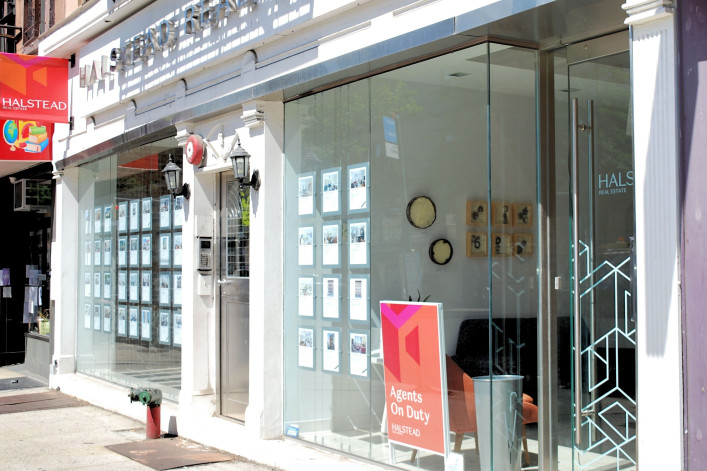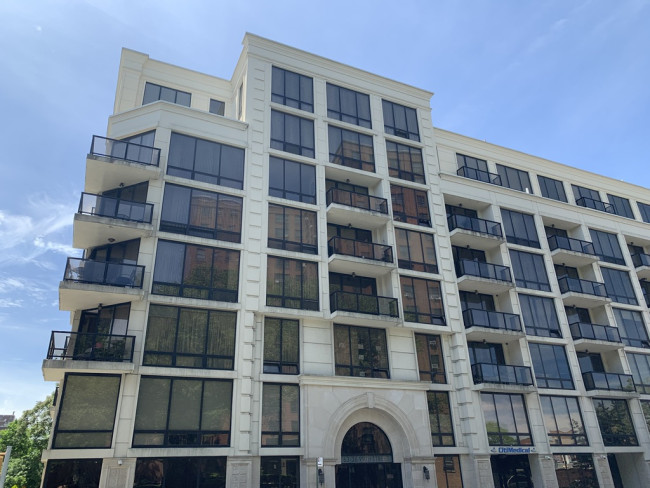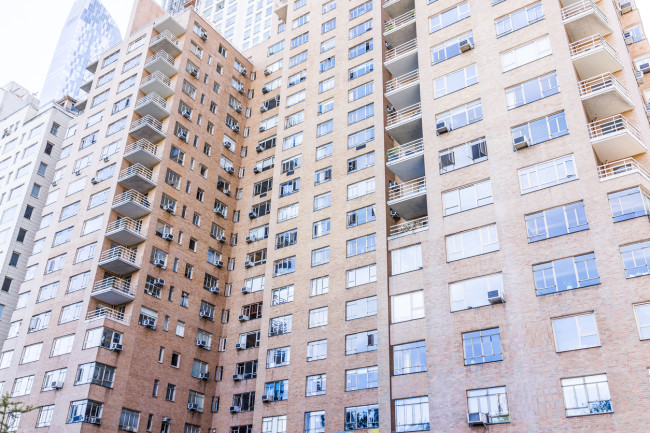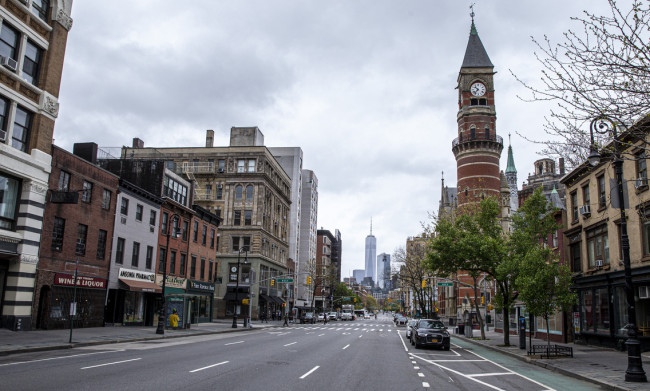What to expect at showings and open houses as NYC enters Phase 2

Expect appointment-only showings, mask wearing, and no handshakes when you’re apartment hunting in the coming months.
If you're looking to rent or buy an apartment in New York City as Phase 2 of the reopening process gets underway, you may be wondering how to keep yourself safe at showings and open houses.
The real estate industry is allowed to conduct business face to face in this next phase, and the Real Estate Board of New York has issued detailed guidelines on how to proceed safely. These instructions to brokers outline how they should navigate open houses, lease signings, and closings, and include recommendations for buildings on how to handle renovations and the use of amenities like laundry rooms and gyms. (Spoiler alert: REBNY thinks they should stay closed.)
Brokers are being asked to follow rules on appointment-only viewings, health screenings, and mask wearing with a continued emphasis on remote transactions. But how practical are these guidelines? Will brokers be able to comply? What are the most likely scenarios? Brick Underground checked in with brokers so you know what to expect.
Open houses by staggered appointment
Even though the guidelines say open houses of vacant or unoccupied properties are allowed, remote walk-throughs are still encouraged wherever possible. The guidelines for open houses include maintaining six feet apart for social distancing, wearing masks and staggering the timings of appointments so there is time to clean surfaces in between each visitor.
Lisa Camillieri, a broker at Warburg Realty, says one-off showings are a sensible solution amid the pandemic. "It is hard to imagine that buyers will want to view via open house anymore—or at least until there's a vaccine—considering that they will potentially come into contact with a lot of people," she says.
Of course it's also possible buildings will have their own rules preventing traditional open houses or showings.
Some brokers are even questioning the value of traditional open houses, where interested buyers stream through an apartment over the course of an afternoon. Certainly, an open house provides a way to gauge how much interest there is an a property and agents might find them useful to introduce themselves to new clients.
However, Arlene Reed, a broker at Warburg Realty, is one of many brokers who says she doesn't believe open houses are all that "valuable or necessary anymore."
One interpretation of the guidelines is to conduct an open house virtually, with only the broker on site and interested buyers participating online at designated times.
Pre-screening buyers to view listings
Michael Rossi, CEO of Elegran, says buyers, sellers, and renters should expect a more rigorous pre-vetting process before being allowed to view listings in-person. That means you'll only be able to view a property if your finances are in order and there are no glaring issues that mean you wouldn't get board approval.
This type of pre-screening is long overdue, says Vickey Barron, a broker at Compass. She says these types of screenings are the norm for high-end apartments, and now the coronavirus is forcing this to happen throughout the city's inventory, which is not a bad thing. "The pandemic is allowing us to fine-tune and correct the broken pieces of how we do business," she says.
Seller's agent and buyers only at showings
One suggestion from REBNY that's getting some pushback is to have only one person inside a property at a time with the seller's agent. This means the buyer's agent can't walk through a property with a buyer if the seller's agent is there.
Sheila Trichter, a broker with Warburg Realty, says if the city permits groups of 10 to meet indoors, the purchaser's broker should be able to attend showings. "I don't feel like I can properly advise my customers if I cannot physically be there with them to see the property," she says.
"You don't want to leave your client in the hands of someone else," says Noel Roberts, head of private clients at Nest Seekers International. "You want to be there to represent them the best you know how."
Staying six feet apart is required as well as the use of masks during any appointment. Buyers at in-person viewings are also being asked to only touch essential surfaces like stair handrails, and brokers are asked to disinfect high-touch areas between showings. The guidelines also recommend windows in apartments should be opened for the viewing.
Limitation of liability forms and health screenings
REBNY has developed a limitation of liability form, which encourages anyone involved in a property transaction to acknowledge that in-person real estate viewings, meetings and transactions carry risks with which they are comfortable. The waivers point out that a refusal to sign may result in the cancellation of an in-person meeting. Another effort to keep all parties healthy is to have everyone sign a health screening questionnaire.
Barron believes the documents are "necessary" but still has concerns about liability if brokers are responsible for sanitizing apartments that are viewed by potential buyers. "It's going to be complicated by the many different layers," she says.
Making transactions as virtual as possible
Before the pandemic, in-person closings were the norm in NYC and they brought together the buyer, seller, the attorneys, a bank attorney (if there was financing), the title insurer, and both agents as paperwork was passed between everyone. There's general agreement that dragging closings into the 21st century, with at least part of the transaction done online, was well overdue.
However, the guidelines acknowledge challenges with virtual closings—which are particularly complicated if you are buying a co-op. Escrow closings were hastily brought in at the beginning of the shutdown where the buyer and seller designate a third party to be the agent for the deal, funds are wired to the escrow agent, and paperwork is signed in advance or done digitally. Many brokers say when it is possible, virtual arrangements are smooth and time efficient.
George Case, an agent at Warburg Realty, just closed a deal virtually and says it was "wonderfully uneventful."
The REBNY guidelines suggest lease signings as well as closings should be done as virtually if possible, with funds transferred electronically. Roberts is mostly doing leases right now and has created unique, sight-unseen disclosures for his rental clients. He calls himself a "DocuSign King" as a result of processing so much paperwork online.
For in-person meetings, the guidelines say keys should be sanitized with disinfectant and any hand-to-hand exchanges done using envelopes. Again, masks should be worn and six feet of social distance should be maintained at any in-person meetings. The guidelines also say if anyone arrives at an appointment without an appropriate face covering, the meeting can be rescheduled "without prejudice or penalty upon any indication of fever or other illness."
You Might Also Like


























